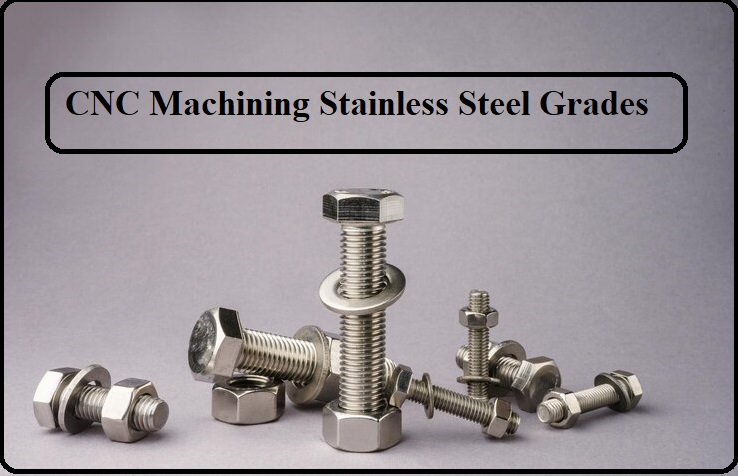
Stainless steel is one of the most popular industrial alloys for various CNC machined parts and products . This is all possible due to its exceptional uniformity and outstanding machinability. Stainless steel can be used to make anything ranging from nuts, bolts, and screws to complex industrial machines. Additionally, most variants of the metal have a very good tensile strength, excellent weldability, and high resistance to corrosion and wear, resulting in added product longevity and durability.
Over the last few decades, stainless steel machined parts have gained immense traction and are often used in several challenging applications, especially in harsh industrial environments dealing with abrasive chemicals, oils, and so on. Today, different grades of stainless steel are preferred to machine different parts depending on the application requirement. This post discusses the CNC machining stainless steel grades along with their industrial uses. So, stay tuned.
Get Introduced to 5 Popular CNC Machining Stainless Steel Grades
Depending on the operating environment the metal needs to withstand, different grades and surface finishes of stainless steel are available. They are classified based on their crystalline structure as follows:
- Austenitic Stainless Steels:
- Ferritic Stainless Steels:
- Martensitic Stainless Steels:
- Precipitation Hardened (PH) Steels:
- Duplex Stainless Steels:
It is one of the best and the most commonly used CNC machining stainless steel grades used today. Compared to other alloy grades, it offers excellent strength, impressive post-machining formability, high corrosion resistance, good weldability, and much higher nickel content. Owing to its crystalline structure, austenitic stainless steel can’t harden by heat or temperature, making it non-magnetic, unlike iron. The most popular austenitic stainless-steel grades are 304 and 316. These steel grades have excellent corrosion resistance properties and improved strength due to the presence of higher-level carbon. Other benefits of 304 and 316 include improved part surface quality, corrosion resistance, lower machining costs, outstanding uniformity, and so on.
It is known for its molecular grain structure and chemical composition. Unlike austenitic stainless steel, these CNC machining stainless steel grades are high-chromium, magnetic, low carbon alloys with high corrosion and stress resistance and oxidation. They are magnetic as the term ferritic implies iron content. This makes them ideal for producing automotive components, kitchenware, petrochemical equipment, and other applications. Although these grades do not possess the same corrosion resistance and tensile strength, their low level of carbon content offers great ductility without compromising on quality. They are non-hardenable by heat and are more cost-efficient than other grades. The numbers in the 400 range denote ferritic stainless steel. Grade 434 and 444 are the most popular examples.
It has a similar structure to ferritic steels; however, it has a high presence of carbon, creating microstructures within the material. This gives alloys great strength and wear resistance. Although it is a hard metal, it can be heat-treated and hardened easily. These CNC machining stainless steel grades are ideal for applications demanding high strength, durability, and average corrosion resistance. This includes turbine components, mechanical valves, and pumps. Like ferritic steels, martensitic steels are also denoted by a 400 number. Grade 440C is the most popular steel with the highest level of strength, wear resistance, and hardness.
These steels are among the strongest grades, heat-treated, corrosion resistant, and so on. Owing to these beneficial features, they are highly preferred for aerospace components, which require extreme reliability and durability. They are a great combination of both martensitic and austenitic alloys. This combination makes them capable of achieving high strength and other important mechanical properties. 17-4 PH or grade 630 are the most common form of PH steels. Basically, they get their name from their composition of chromium (which is 17%) and nickel (which is 4%).
Popularly called austenitic-ferritic stainless steels, they contain both ferritic and austenitic microstructures. They are corrosion resistant and can provide double the strength of ferritic and austenitic steel grades. They do not contain a high molybdenum and nickel content, thus reducing manufacturing costs compared to austenitic steels. These CNC machining stainless steel grades are ideal for heavy industrial applications, like the petrochemical industry.
Industrial Applications of Stainless Steel Machined Parts
Stainless steel machined parts are mainly used for products demanding strong corrosion and oxidation resistance, reliability, and so on. Several industrial and architectural products can be produced using stainless steel. These may include:
- Nuts and bolts and other fasteners
- Cutlery
- Car parts
- Valves
- Knives
- Firearms
- Hand tools
- Heater Plates
- Food processing equipment
- Industrial gas turbines
- Sensors
- Surgical instruments
- Steam, gas, and jet turbine blades
If you are looking for precisely machined stainless steel parts for your upcoming products, it is always good to consult experienced industry players like Princeton Industrial Products, Inc. The company has vast years of industry experience in CNC machining and fabrication. In addition, the skilled and experienced team of experts at Princeton Industrial Products, Inc. thoroughly understands client requirements and offers the right assistance related to your machining requirements.



